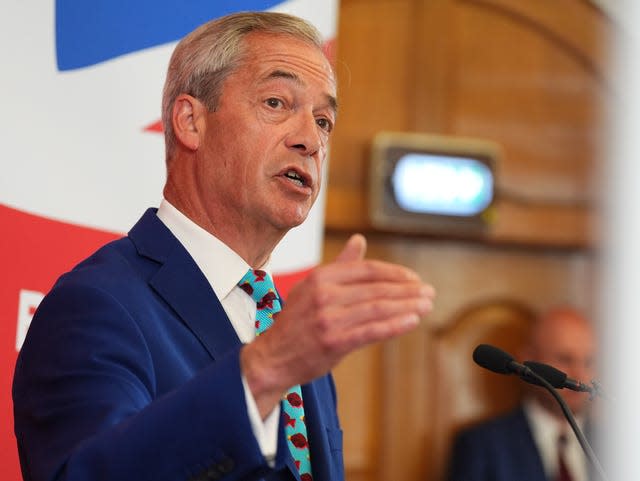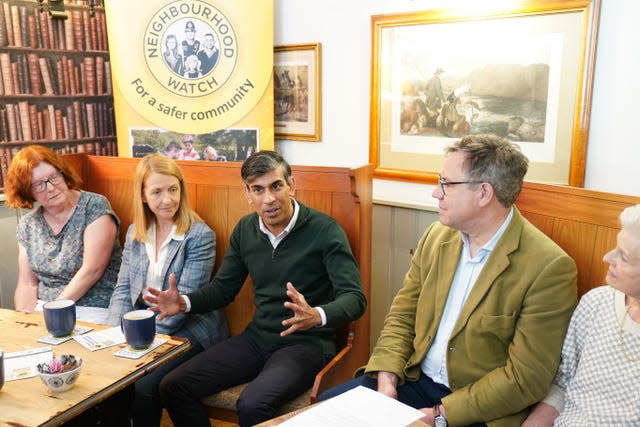Rishi Sunak makes manifesto tax cut pledge after dismissing resignation rumours

Rishi Sunak has insisted tax cuts will be on offer in the Conservative Party manifesto, as he urged Tory voters not to have their heads turned by Nigel Farage.
The Prime Minister, who earlier on Monday dismissed rumours that he might resign ahead of polling day on July 4, also acknowledged it has become harder for people to own their first home under the Conservatives.
His remarks came during the first of a series of 30-minute leadership interviews by Nick Robinson for BBC Panorama.
Speaking on the eve of the manifesto launch, Mr Sunak said: “We will have a manifesto tomorrow that builds on all the things that you’ve just gone through, that we’ve already announced in this campaign, that, yes, does continue to cut people’s taxes, because I believe in a country where people’s hard work is rewarded.
“And there’s a clear choice in contrast at this election, our party, the Conservatives, are promising, and will deliver tax cuts, building on the tax cuts that we have already started to deliver, and have ruled out tax rises, that’s not what the Labour Party are doing.
“They are being open that some taxes are going to go up, but what they’re not telling everyone is that there is a £2,000 tax bill waiting for working families across our country if they are elected.”
Figures provided by the Organisation for Economic Co-operation and Development (OECD) have previously showed the UK’s current level of tax burden is the highest on record.
Statistics published late last year showed tax hit 35.3% of gross domestic product in 2022/23, a 0.9% increase on the previous year. This ratio is forecast to grow to 37.7% by 2029, with the Government’s freeze on tax ratios the dominant driver.
Mr Sunak last week denied accusations from Labour leader Sir Keir Starmer that he “lied” by saying Labour would hike taxes by £2,000 in claims criticised by the UK statistics watchdog.
The Prime Minister also said he did not want to talk about personalities when challenged about Reform UK leader Mr Farage.
He said: “So the choice for everybody, there’s only going to be one of two people who’s prime minister, Keir Starmer or myself.

“A vote for anyone who’s not a Conservative candidate is just making it more likely that Keir Starmer is that person.
“So if you ask someone, you say, you know, what makes a Conservative, if you are someone who wants lower taxes, if you want your pension protected, if you want migration reduced, if you want a sensible approach to net zero that prioritises our security and reducing people’s bills, that’s what I will offer you in this election.”
After being told by Mr Robinson that he was viewed by Conservatives as a “quinoa salad” and Mr Farage as a “Sunday roast with all the trimmings”, Mr Sunak said he believed “policies are what matter”.
He added: “The simple issue here is a vote for anyone else, including Nigel Farage’s party – and I would make the same point about anyone’s party – is ultimately a vote that makes it more likely that Keir Starmer is in power.”
On the situation for first-time buyers, Mr Sunak said: “It has got harder and I want to make sure that it’s easier and what we will do is not just build homes in the right places and do that in a way that is sensitive to local communities, but make sure that we support young people into great jobs so they can save for that deposit.”
Labour deputy leader Angela Rayner said: “Rishi Sunak’s confession that having a home of your own has got harder under the Tories is a damning indictment of 14 years of housing failure.
“Home ownership is a pipedream for young people in Britain today.
“Never once in 14 years have the Tories met their 300,000-a-year housing target, and their recent decision to appease the Tory MPs on their backbenches and abolish mandatory housing targets has seen housebuilding take a nosedive.”

Earlier on Monday, Mr Sunak responded to the continued fallout over his early departure from D-Day commemorations.
Criticism of his early exit from the 80th anniversary of the Normandy landings dogged the Prime Minister over the weekend, when he kept a low profile and avoided questions from reporters.
But during a campaign visit on Monday in Horsham, West Sussex, which has a Tory majority of 21,127, he told journalists he would not stop “fighting for the future of our country”.
Asked whether resigning had crossed his mind, Mr Sunak told broadcasters during a visit to the Dog and Bacon pub in Horsham: “No, of course not.
“I’m energised about the vision that we’re putting forward for the country.
“This campaign is not even halfway through yet, and I’m finding enormous amount of support for the policies that we’re putting on the table.”
On the rumours, he also told reporters on the campaign trail: “People are gonna say what they’re gonna say.”
The Prime Minister also struck a renewed conciliatory tone over his D-Day departure, telling reporters he “absolutely didn’t mean to cause anyone any hurt or upset”.
“I just hope people can find it in their hearts to forgive me,” he added.
Election campaign in full swing!
Hoping for big swings to the Lib Dems in the blue wall 🎢 pic.twitter.com/vyEipjWd7e
— Ed Davey (@EdwardJDavey) June 10, 2024
Elsewhere, the Liberal Democrats launched their full election manifesto, with an offer of a £9.4 billion package for the NHS and social care in England.
Sir Keir also said it was wrong for shadow attorney general Emily Thornberry to suggest that Labour’s plan to add VAT to private school fees would lead to larger class sizes in the state sector.

 Yahoo News
Yahoo News 
